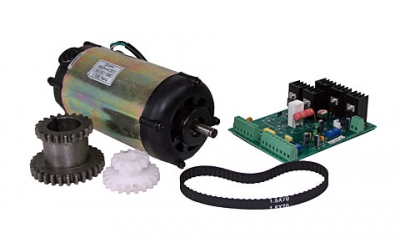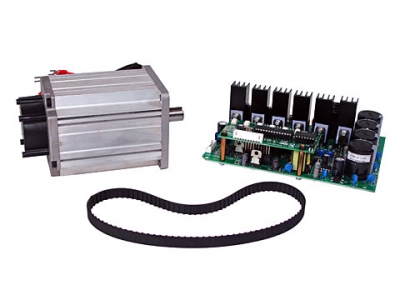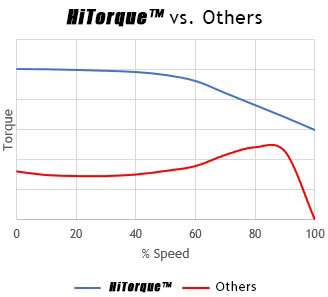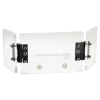What's the Difference?
You might wonder what the difference is between the SIEG
Mini Lathe and the HiTorque Mini Lathe or between the SIEG Mini Mill and the
HiTorque Mini Mill. They share many of the same features. For example, both mini
mills incorporate the large X-Y table. (Visit our
mini mill or
mini lathe comparison
pages for more details.) The most significant difference is the
drive system. The photos below show the major components of the two drives.
SIEG Drive System |
HiTorque Drive System |
 |
 |
|
The SIEG drive on the mini lathe and mini mill incorporates a 350 Watt
conventional wound rotor DC motor and PWM controller card. The gears provide two
speed ranges to enhance low speed torque because the output torque of a DC drive
like this falls off as the motor speed is reduced.
|
The HiTorque drive system on the mini lathe and mini mill incorporates a 500
Watt brushless DC motor and controller. The wound stator and permanent magnet
rotor provide virtually constant torque over the entire speed range. RPM feedback
from the motor to the controller helps insure constant speed through varying
loads.
|
|
See the SIEG machines
|
See the HiTorque Machines
|
Why Is the HiTorque Drive Better?
 Besides simply having more horsepower (500W is
0.67hp, 350W is 0.47hp), the brushless DC drive in the HiTorque mini lathe and
mini mill have greater torque, especially at low speeds. Compare the typical
torque curves. Besides simply having more horsepower (500W is
0.67hp, 350W is 0.47hp), the brushless DC drive in the HiTorque mini lathe and
mini mill have greater torque, especially at low speeds. Compare the typical
torque curves.
The HiTorque drive lets you take deeper cuts at all
speeds, and the low speed torque makes slow-speed operations like parting off
significantly easier.
Because of the nearly linear torque curve, the HiTorque drive does
not need 2-speed gears. There is one continuous speed range. This means there
are no gears to shift and no plastic gears to break.
|
YouTube Videos
These videos provide more information than most of us want to know.
|
| About PWM |
About brushless DC motors |
|



 Besides simply having more horsepower (500W is
0.67hp, 350W is 0.47hp), the brushless DC drive in the HiTorque mini lathe and
mini mill have greater torque, especially at low speeds. Compare the typical
torque curves.
Besides simply having more horsepower (500W is
0.67hp, 350W is 0.47hp), the brushless DC drive in the HiTorque mini lathe and
mini mill have greater torque, especially at low speeds. Compare the typical
torque curves.
 Chip Shield, Magnetic for 3" - 4" Vise, Clear
Chip Shield, Magnetic for 3" - 4" Vise, Clear
